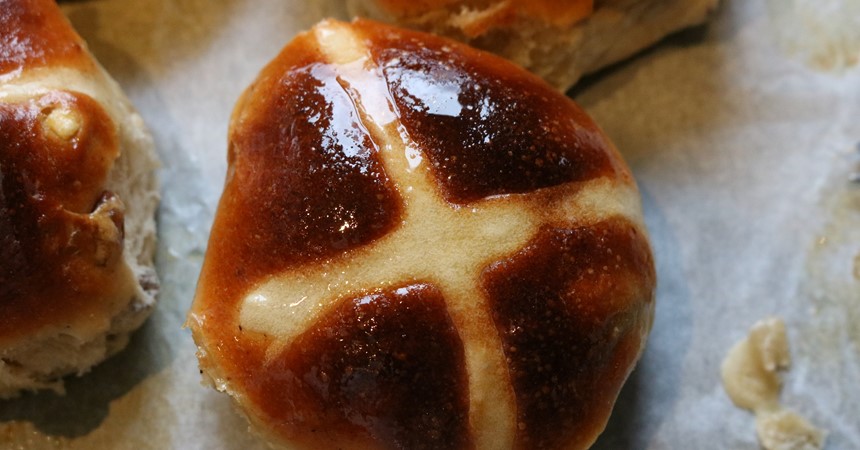In the Christian tradition, hot cross buns have been consumed only on Good Friday as the cross on the top of the spiced fruit bun symbolises Jesus’ death on the cross. Now, you can not only get hot cross buns throughout the entire year, but you can also buy hot cross bun flavoured breakfast cereal, ice cream, hot chocolate, nougat, marshmallows, rocky road, tea, gin, cocktails and even scented candles and essential oils.
Another time I was stopped in my tracks was when I saw a billboard outside Westfield just before Easter depicting the Last Supper. The image, which was appropriated from Leonardo da Vinci’s Last Supper, displayed models wearing the latest skimpiest fashion, sitting, and reclining across a crisp white table.
I am intrigued by the mind of the advertiser, the one who manipulates the sacred into the secular. I readily question how far they will go to seduce the consumeristic mind.
There is no doubt that our world is constantly changing and while change is inevitable for multiple reasons, I wonder what needs to really happen so rich traditions are not exploited in such radical ways that their foundations become distant memories of the past.
While formation and education are good starting points, we need to be willing to move into these spaces, places and give ourselves the time to develop a deepened understanding. This will not only open the mind, but the heart as well.
During Lent we have been encouraged to move out of Chronos time and enter the sacred Kairos time, to slow down and be with God. This can be very difficult in the demands of daily life. If we have allowed the time, we have been provided opportunities for reflection, contemplation, and spiritual growth. The Mystagogical reflection process, which has been the foundation of our diocesan synodal reflections have enabled a deep and rich understanding of the scripture as the mystery of God is revealed. It is in this process we are compelled to look with fresh eyes, as we consider how our story is interwoven within the scripture, and how we will live life differently because of this connection. We have been formed through the scripture and faith sharing and now consider how we can be tempted, how we can be transformed, how we can grow, how we can welcome and how we can forgive.
As we enter Holy Week on Palm Sunday we are invited to walk with Jesus through his triumphs and sufferings. On Holy Thursday at the Last Supper, we see Jesus as a humble servant wash his disciples’ feet. Jesus shifts the focus from the remembrance of the old covenant found in the Jewish Passover to the New Covenant at the Last Supper. The Passover liturgy revolves around the body and blood of the lamb. Jesus now focuses on his own body and blood, placing himself as the sacrificial lamb. He takes the bread and wine and explains it in a new light: “This is my body. This is my blood.” This New Passover is the Eucharistic celebration, the Mass. It is during the Eucharistic celebration that we are invited to enter the sacred ritual and live life in memory of Christ and become Christ in the world today.
Good Friday is the day when the pain and suffering of Jesus is remembered as he dies on the cross. Most Western Christian Churches clearly display the events of this day as artworks around the interior walls within the Church and this day is spent retracing and re-enacting the stations in prayer and reflection. It is the most solemn day of the year for Christians. It is a day for us to turn our gaze to the cross and recognize Christ’s most loving sacrifice for us.
Easter Sunday is the most important day on the liturgical calendar, if Christ had not risen, we would not have the Christian faith. Easter is not only foundational it revitalizes our hope and brings forth new life. Easter symbolises how love will always conquer hate, love will transform us and help us live life to the full. Midst of darkness, challenges or struggle, the paschal mystery (life, death and resurrection) offers hope to all of us and to the world.
This weekend as we gather with our families to celebrate Easter sharing hot cross buns and chocolate eggs, spend some time to reflect on our Christian faith story so the sacred meaning of the season is not lost over to the secular.
The Formation and Education office of Pastoral Ministries will be launching their a newsletter after Easter, to subscribe go to: https://forms.office.com/r/AH7wE0MRTu
For more information on upcoming events and faith formation resources go to: https://www.mn.catholic.org.au/church-mission/catholic-life/faith-formation/
